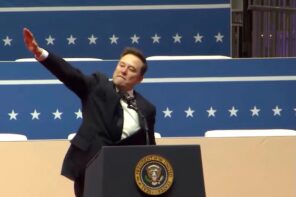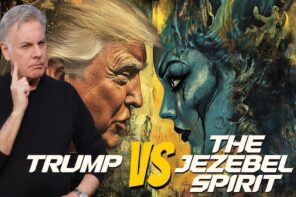Recently, an Indiana Moms for Liberty chapter included—and attributed—a quote from Adolf Hitler in their newsletter: “He alone, who OWNS the youth, GAINS the future.” After backlash, the chapter went into damage control and chapter chair Paige Miller wrote in a revised newsletter, “We condemn Adolf Hitler’s actions and his dark place in human history.”
At their Philadelphia summit, as Annika Brockschmidt notes here at RD, Moms for Liberty frames their “hatred for ‘the Left,’ the LGBTQ+ community, and anti-racism efforts” as measures to protect children. Patriot Mobile spokeswoman Leigh Wambsganss told the crowd, “Our children belong to the Lord, not the government . . . This is not a political war, it is a spiritual war.” The summit, Brockschmidt observed, pulsed with a “religious character,” employing spiritual warfare imagery to promote the group’s agenda.
The Southern Poverty Law Center classifies Moms for Liberty as an “anti-government extremist group,” and Vice’s David Gilbert uncovers the connections between Moms for Liberty and the Proud Boys, Three Percenters, and Christian nationalists. A Kentucky chapter, Gilbert reports, had John Birch Society member Pastor Jon Schrock speak to them “about defunding public education.” Amidst a litany of conspiracy theories, Schrock got to his main point, that educators should be replaced with “pastors” who would teach a curriculum “rooted in Christian fundamentalism.”
During the same period, Ryan Helfenbein, director of the Standing for Freedom Center at Liberty University, brought up Hitler, Joseph Stalin and Mao Zedong on education during an interview at a Faith and Freedom coalition event. When asked about the “brainwashing” of a generation in the classroom, Helfenbein replied by agreeing with the interviewer’s claim that the “left” is “indoctrinating” students, before adding:
“What we’re discovering as parents and conservatives is [that] education really is evangelism. So, if you don’t control education, you cannot control the future. And Stalin knew that, Mao knew that, Hitler knew that. We have to get that back for conservative values.”
Education has long been a battlefield for Christian nationalists. While textbooks such as America’s Providential History have been around for decades and tactics have evolved over time, the end goal remains the same: to construct a Christian nationalist education system leading to the establishment of a Christian nationalist nation. We’re seeing a surge of directives and laws being passed across the nation to overhaul the education system and prevent the promotion of diversity, equity, and inclusion. A governor-appointed commission in Georgia voted to remove the words “diversity,” “equity,” “inclusion,” and even “social justice” from teaching standards, while Louisiana, Rep. Clay Higgins proposes that public libraries be replaced with church-owned alternatives claiming that libraries have become “liberal grooming centers.”
Some legislators embrace the term Christian nationalism in describing their positions. Rep. Marjorie Taylor Greene, at a TPUSA event in 2022 proclaimed, “We need to be the party of nationalism and I’m a Christian, and I say it proudly, we should be Christian nationalists.” Amidst all of this, the relevance of the work of twentieth century civil rights author Lillian Smith to these current issues speaks to the importance of historical perspectives in efforts to counter today’s threats against democracy.
“Ever since the first white Christian enslaved the first black man, the conscience of America has been hurting.” One would not find this sentence out of place in writings by Anthea Butler, Kristin Kobes du Mez, Danté Stewart, or Robert Jones—yet, none of the above wrote these words. Rather, they open Smith’s 1943 essay, “The White Christian and His Conscience.”
Written 80 years ago, Smith’s words run directly afoul of current laws such as Florida’s “stop WOKE act” and “divisive concepts” laws spreading across the nation. At its core, the essay targets Christian nationalism in the early 1940s and points out the threat it poses to democracy by linking it directly with fascism in Nazi Germany.
Smith’s work grapples with conflicts of race and systemic inequality that are intertwined in American society. During Jim Crow, Smith examined the influence of Christian nationalism on the issues of her time, and her work continues to speak to us today. Current attempts by right-wing politicians to blur the lines of separation between church and state are a continuation of nationalist and fascist movements that existed not only in Smith’s lifetime, but throughout all of American history.
Over the course of the essay, Smith recounts how Nazi Germany provided an external enemy that allowed White Christians in the United States, and especially in the Jim Crow South, to justify their own racist actions. After presenting Nazi atrocities and Hitler’s regimented dismantling of democracy, Smith asks her readers to look upon themselves, highlighting the stark contradictions at the center of Christian nationalism. She writes:
“The white man in America was willing neither to give up Jesus nor to give up the slave. He was willing neither to give up democracy, nor white supremacy. He was willing neither to give up his conscience or his way of life.”
She highlights how the cognitive dissonance created by Christian nationalism damages “our culture, our personalities, our children, seeping through every level of our life like a slow-spreading poison.”
Smith saw the ways that sex, what she called “sin,” and segregation joined together to maintain White supremacist beliefs for many Christians, encountering the lessons early. In “Growing into Freedom,” she details how she learned “that it is possible to be a Christian and a Southerner simultaneously; to be a gentlewoman and an arrogant callous creature in the same moment; to believe in freedom, to glow when the word is used, and to practice slavery from morning to night.” Initially, these lessons hindered Smith from initially looking upon her own self and interrogating the lessons she had learned.
To move past the “deep inner conflict,” one must look in the mirror and dissect these internalized lessons. But this reflection comes with a price. If they believe in justice and equality, as Smith writes, “they must give up the teachings of their beloved families. For some people this is hard to do. It is like tearing part of your life out.”
What’s the alternative? The poison continues to spread and they turn to hateful rhetoric. “It is so easy to use one’s hate as a crutch to lean upon when one feels weak,” Smith writes, “It is easy to use feelings of persecution as an excuse not to change one’s own attitude; as an excuse not to act constructively.”
Current manifestations of hateful rhetoric, whether spewed from the stage in Philadelphia, in newsletters in Indiana, at galas, and in countless other places, cordon off self-reflection. They serve, as Smith noted in her work, as a means “to win an election, to break the strength of a union, to keep jobs for the white man,” all of which coalesced in “its main use . . . [which is] to keep the white man from seeing what he is doing to other human beings.”
If, as Moms for Liberty insists, they want to “protect children,” what does all of this do to children themselves? We know the harm it enacts upon those the group targets, but what does it do to a child in a Christian nationalist home who takes these lessons to heart? This is the question that Smith grapples with, pointing out that imbibing these lessons “tears up the heart and mind as much as to be hated.”
That may be an exaggeration, but the important point is that it isn’t innocuous. It causes the heart to become calloused and creates deep chasms between individuals that can only be crossed with self-reflection, because, as Smith states, “A child’s personality grows by reaching out to others, by feeling identified with them, by acknowledging the common dignity of all men.”
Calls for education reform and “protecting” children reside at the core of Christian nationalism because when children grow up and learn the lessons, they become so entangled in its grasp that extricating themselves from it requires extensive and difficult work. Smith sums this up in Killers of The Dream (1949) where she details a conversation with a camper she’d had as director of Laurel Falls Camp for Girls. The camper, about 17 at the time, confronted Smith one night telling her, “I almost hate you to-night, for letting us fall in love with beliefs that I see now we can’t possibly live.”
The camper continues, saying that it felt as though Smith had “swung a bright mirror” in front of her, causing her to look upon herself and ultimately hate her family. She tells Smith she knew what she learned at camp—to love her neighbor as herself and not to feel superior to anyone—was right, but she couldn’t act on those beliefs when she returned home from camp because, as she says, “I’m scared—at what I am looking at in me.”
The reflection staring back at the young girl scared her, and facing that reflection caused her to tell Smith that she would teach her children “not to think about things like this” and “that money comes first.” Smith replies, “In other words, you would make little Nazis out of them.”
The camper replies, “At least it would be honest.” She chose this route out of fear—fear of the future and her position within that future. The reactions she (probably accurately) anticipated scared her, even though she knew right from wrong. “To change things,” she tells Smith, “you’ve got to get mad when you see folks do what you think is wrong.” But she could not do that. After Smith lays bare the history of racism in America, the camper concludes by getting to the crux of her fears: “I guess . . . if you hated your family, it would be easier to fight for what is right, down here. It would be easier if you didn’t care how much you hurt them.”
The camper embodies the impact of Christian nationalism on the children it purports to protect. She embodies the psychological conflicts that such lessons graft upon the psyche of children as they grow. She knows the difference between right and wrong and how that butts up against the cognitive dissonance Christian nationalism created within her. In essence, she embodies the impact of groups like Moms for Liberty on children and future generations.





